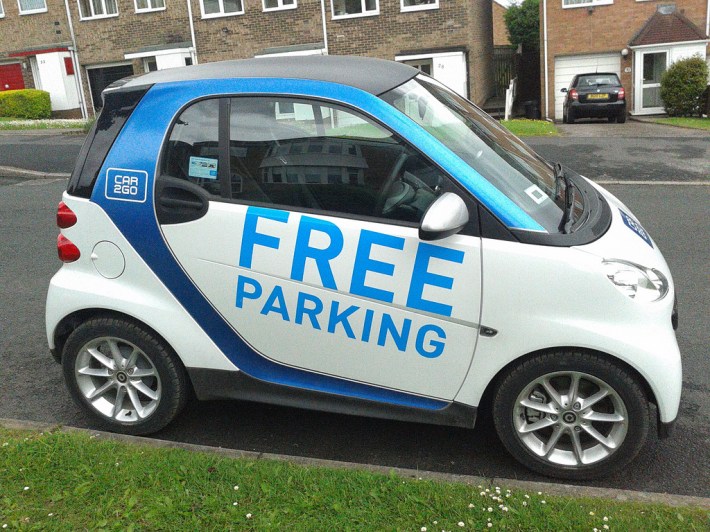Many New Yorkers are familiar with car-sharing services -- like Zipcar, Hertz Connect, Enterprise CarShare, and Carpingo -- that charge by the hour or day, with a reserved space where customers must start and finish a round-trip rental. Daimler-owned Car2Go operates differently: it charges by the minute or hour, and is focused on one-way rentals, allowing users to return a car to any on-street space within the company's service area. The company, already operating in ten North American markets, is eyeing New York.

"In the last few months, Car2Go has met with several New York City community groups, as well as NYC DOT," Car2Go East Coast business development manager Josh Moskowitz said in an e-mail. Those meetings included a presentation to the transportation committee of Brooklyn Community Board 7, which covers Windsor Terrace and Sunset Park, indicating that the company is looking beyond Manhattan.
While the potential entry of point-to-point car-sharing to New York has implications for transportation behavior (Will it induce more car trips? Will it encourage households to go car-free?), it also raises another important question: How much is a parking spot worth?
When it launched a 200-car fleet in Washington, DC, last year, Car2Go paid the local government $578,000 annually, or $2,890 per car. The payment granted its users unlimited access to all residential permit zones and metered spaces at no direct cost, though the cars are still subject to rush-hour and street-sweeping restrictions. (The District government's car-share manager at the time was Josh Moskowitz, before Car2Go hired him.)
When the company decided to expand its fleet by 100 vehicles, it paid the DC government an additional $215,300 per year, or $2,153 per car. In Portland, Car2Go pays the city $1,009 per vehicle per year for curbside access.
It's not just general access to the curb that's being sold for thousands of dollars each year. Car-share services are also paying cities for specific parking spots. In 2010, the DC government auctioned off 86 curbside parking spaces to car-share companies, fetching an average of $3,485 for each space, according to TBD.com.
Instead of an auction, San Francisco has opted to give car-share services access to hundreds of spaces in exchange for set fees. High-demand areas would command higher prices; as a result, the city expects to earn anywhere from $600 to $2,700 for each space annually. In Los Angeles, the city has entered into an agreement with Hertz in which the company pays at least $1,500 per space each year [PDF].
These prices are far higher than what private car owners pay to park in most curbside spaces -- which is basically nothing.
Streetsblog SF recently noted the discrepancy:
While [car-share companies] -- which offer services that make it easier for residents to go without owning personal vehicles -- will pay up to $225 per month for reserved spots, private car owners will generally continue to pay nothing for the use of unmetered spaces. While it makes perfect sense to charge car-share companies a fee for on-street spaces, the new policy highlights the absurdity of giving away the same precious real estate for the storage of privately-owned automobiles.
In some cities, there's a minimal cost to store cars on public streets: San Francisco charges $106 per year for a residential parking permit, while DC charges just $35. But these are "hunting licenses" that grant permission to park, not prices for actual curb space, and aren't comparable to what car-share companies pay.
Here in New York, there is no RPP program. With the exception of metered commercial areas, which are dwarfed by un-metered areas, curbside parking is given out for free on a first-come-first-served basis. And even most metered spots are underpriced compared to nearby off-street spaces, leading drivers to cruise in search of a curbside bargain.
Will the arrival of point-to-point car-sharing provide a glimpse of what curbside space is really worth? DOT has not entered into curbside agreements with car-sharing services, and while the agency has had preliminary conversations with Car2Go, it says it is not in discussions with the company at this time.
It's possible that Car2Go could start operating in New York without illuminating the value of city street space at all. DOT noted that by using free on-street spaces or off-street parking, Car2Go could still set up shop without requiring the agency to draw up an agreement that might charge for curbside access.





